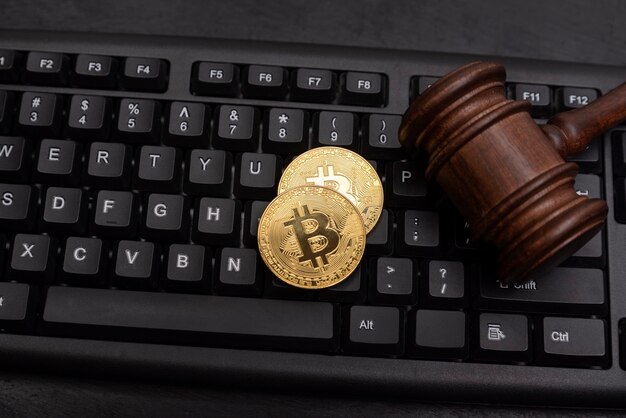Is Bitcoin Mining Legal? Understanding the Legality of Cryptocurrency Mining
In today’s dynamic and ever-evolving world of digital currencies, a particular practice has gained immense popularity and attention. This captivating endeavor allows individuals to delve into the realm of creating and securing this revolutionary form of wealth, all while staying within the boundaries defined by the law. As the sun sets on traditional financial landscapes, and the dawn of decentralized cryptocurrencies breaks, one question prevails: is the process of generating digital assets lawful?
Exploring the fascinating realm of cryptocurrency mining poses a plethora of questions surrounding its legal status. With numerous countries and jurisdictions acknowledging the power and potential of digital currencies, it becomes imperative to discern the nuances and intricacies associated with this captivating process formally. Uncovering the legal landscape that surrounds the creation of these virtual treasures requires a meticulous understanding of the regulatory framework, which ultimately dictates whether the act is approved or deemed illicit.
Shedding light on the legality of cryptocurrency mining necessitates the exploration of the diverse perspectives held by governments, financial institutions, and legal entities worldwide. While some jurisdictions embrace this futuristic phenomenon with open arms, recognizing its potential to shape the future of finance, others tread more cautiously, evaluating its impact and potential risks. A symphony of ideologies and perspectives intertwines, creating a complex tapestry of legal frameworks that govern the mining activity, with considerations ranging from tax regulations to environmental concerns.
Is Bitcoin Mining Legal or Illegal?
In the realm of digital currency, the question of whether bitcoin mining is lawful or illicit is one that many individuals are curious about. The legitimacy of engaging in the process of verifying and adding bitcoin transactions to the blockchain has been a subject of debate in various jurisdictions. This section aims to explore the legal landscape surrounding bitcoin mining, without explicitly referring to the terms ‘bitcoin’ and ‘mining’.
It is essential to understand the regulatory framework and the stance of governments and financial institutions towards the generation of digital assets through computational processes. Take into account the rules and principles that govern the creation of decentralized digital currencies and how these principles align with existing legal frameworks.
To gain a comprehensive understanding of the legality of the activity, it is crucial to examine the implications for individuals and businesses who partake in the process of securing and validating transactions in a decentralized digital network utilizing computational power. Consider the potential consequences, both positive and negative, that may arise from engaging in this activity.
| Pros | Cons |
|---|---|
| Financial independence | Concerns about energy consumption and environmental impact |
| Participation in a dynamic and evolving industry | Potential regulatory challenges and legal ambiguities |
| Possibility of earning substantial profits | Risk of operating in an unregulated and volatile market |
Legal implications may vary depending on the jurisdiction one resides in. It is important to be aware of the local laws and regulations that govern the use and creation of digital assets through computational processes. Consulting legal professionals and staying updated on the evolving legal landscape can provide clarity on the status of bitcoin mining within a specific jurisdiction.
In conclusion, the question of whether bitcoin mining is legal or illegal is a complex one that involves examining the legal frameworks, potential benefits, and drawbacks of engaging in this activity. It is crucial for individuals and businesses considering bitcoin mining to thoroughly understand the legal landscape and consult legal professionals for guidance.
Understanding the Legality of Bitcoin Mining Worldwide
The global landscape surrounding the practice of cryptocurrency mining is one fraught with a complex web of regulations and legal considerations. This section aims to provide an overview of the legal status of bitcoin mining across different countries and regions, shedding light on the various approaches taken by governments and regulatory bodies.
1. Classification and Regulatory Frameworks
To comprehend the legality of bitcoin mining, it is crucial to understand how governments categorize cryptocurrencies within their existing legal frameworks. Some countries treat cryptocurrencies as commodities, subjecting them to regulations similar to traditional assets like stocks or commodities. Others view them as virtual currencies, applying existing currency regulations to guide their use. Additionally, some nations have specific legislation governing cryptocurrencies and mining activities.
2. Legal Approaches Taken by Different Countries
Countries worldwide have adopted widely varying stances on the legality of bitcoin mining. While some nations have embraced and regulated the practice, others have taken a more cautious approach, imposing strict regulations or outright banning it. It is important to explore these different approaches to gain a comprehensive understanding of the global legal landscape surrounding bitcoin mining.
- In some countries, bitcoin mining is fully legal and recognized as a legitimate activity with specific licensing requirements.
- Other countries impose certain restrictions or regulations on mining, such as requiring miners to register or obtain permits.
- Several nations have banned bitcoin mining due to concerns about its environmental impact, energy consumption, or potential use in illegal activities.
- There are countries where the legal status of mining remains uncertain, with ongoing discussions and debates among policymakers and regulators.
It is prudent for anyone interested in bitcoin mining to familiarize themselves with the legal environment of their jurisdiction to ensure compliance with applicable laws or regulations. Additionally, understanding the global legal landscape can provide insights for miners looking to operate in jurisdictions that offer favorable conditions for mining activities.
The Role of Government Regulations in Bitcoin Mining
Government regulations play a crucial role in overseeing the operations and activities related to the creation of digital currencies and the process of validating transactions. These regulations aim to address various concerns, including ensuring security, maintaining financial stability, combating illegal activities, and protecting consumers.
Government bodies, such as financial regulators and central banks, monitor and establish rules and guidelines for the operation of cryptocurrency mining activities. These regulations help to create a transparent and accountable environment for miners and users alike.
One of the key objectives of government regulations in relation to cryptocurrency mining is to prevent illicit activities, such as money laundering and funding terrorist organizations. By implementing strict regulatory frameworks, governments aim to identify and address any potential risks associated with the use of digital currencies for criminal purposes.
Furthermore, government regulations for Bitcoin mining also focus on consumer protection. These regulations require miners to adhere to specific standards in order to secure the integrity of transactions and protect users from fraud or financial loss.
In addition, governments aim to maintain financial stability by overseeing the mining industry. They may establish regulations to limit the concentration of mining power in the hands of a few dominant players, ensuring fair competition and preventing the centralization of mining activities.
Ultimately, government regulations in Bitcoin mining serve to create an environment where the benefits of this technology can be maximized while minimizing risks to the economy and consumers. By striking a balance between innovation and oversight, governments strive to foster the growth and development of the cryptocurrency industry.
How Governments Around the World Regulate Cryptocurrency Mining
In the global landscape, various governments have taken different approaches to regulate the process of generating digital currencies. This section delves into how nations around the world are managing and overseeing the activity of producing cryptocurrencies.
Government bodies across the globe have recognized the significance of cryptocurrency mining and its impact on the economy. As a result, they have introduced regulations to ensure the legality, security, and transparency of the mining process. While the specific rules may vary from country to country, the overarching goal is to strike a balance between fostering innovation and protecting public interests.
Some countries have embraced cryptocurrency mining as an opportunity for economic growth and have actively encouraged its development. These nations have implemented favorable policies, such as tax incentives and streamlined procedures, to attract miners and facilitate the establishment of mining farms. By doing so, they aim to position themselves as hubs for cryptocurrency innovation and attract investments in related industries.
On the other hand, certain governments have imposed stricter regulations on cryptocurrency mining, often due to concerns over money laundering, tax evasion, and potential risks associated with unregulated financial activities. These countries may require miners to obtain licenses, adhere to specific operating guidelines, or even limit the use of certain cryptocurrencies altogether. Their intention is to mitigate the potential negative consequences of uncontrolled mining activities while still allowing for responsible cryptocurrency production.
Furthermore, international cooperation and coordination among governments play a crucial role in shaping the regulatory landscape for cryptocurrency mining. Given the decentralized nature of cryptocurrencies, collaboration between countries becomes crucial to effectively address issues such as cross-border transactions, regulatory arbitrage, and the prevention of illicit activities.
Overall, the regulation of cryptocurrency mining is a dynamic and evolving field. Governments worldwide are continuously evaluating and updating their approaches to strike a balance between harnessing the benefits of this emerging industry and mitigating any potential risks it may pose to financial systems and public interests.
Environmental Impact of Cryptocurrency Mining
Cryptocurrency mining has significant ramifications for the environment, affecting various aspects of our ecosystem. The process of validating and verifying transactions in the blockchain requires computational power, which in turn consumes a substantial amount of energy. This energy consumption has raised concerns about the environmental sustainability of cryptocurrency mining.
One of the main environmental implications of cryptocurrency mining is the excessive energy usage. The high computational demands of mining operations require powerful hardware and continuous electricity supply. As a result, large-scale mining operations often rely on fossil fuels, contributing to carbon emissions and exacerbating climate change. Moreover, the sheer energy consumption of mining activities can strain local power grids, putting additional pressure on the energy infrastructure.
In addition to energy consumption, the production and disposal of mining equipment also have environmental consequences. The manufacturing process of mining rigs and other hardware involves the extraction of raw materials, such as metals and rare earth elements, which can lead to habitat destruction, soil erosion, and water pollution. Furthermore, the improper disposal of outdated or obsolete mining equipment can result in electronic waste, posing risks to human health and contaminating the environment.
The environmental impact of cryptocurrency mining extends beyond energy usage and hardware production. Mining operations often require significant cooling systems to prevent overheating of the equipment. These cooling mechanisms consume additional energy and contribute to greenhouse gas emissions. Additionally, the noise generated by mining farms can disturb wildlife and disrupt local ecosystems, particularly in areas close to residential or protected areas.
Efforts are being made to address the environmental implications of cryptocurrency mining. Some mining operations are exploring the integration of renewable energy sources, such as solar or wind power, to mitigate carbon emissions. Others are focusing on optimizing energy efficiency and implementing sustainable mining practices. However, the scale and growth of cryptocurrency mining pose ongoing challenges in achieving a truly sustainable and environmentally friendly industry.
In conclusion, the environmental implications of cryptocurrency mining are significant and multifaceted. The industry’s high energy consumption, reliance on fossil fuels, and waste generation present challenges to environmental sustainability. As the popularity of cryptocurrencies continues to rise, it becomes increasingly important to address these environmental concerns and explore sustainable solutions for the future of mining.
Exploring the Environmental Impact of Digital Currency Extraction
Delving into the ecological consequences of the extraction process underlying various digital currencies, this section sheds light on the environmental ramifications associated with the creation of cryptocurrencies. By closely examining the ecological footprint of these processes, we gain insight into the potential effects on our planet’s delicate ecosystems.
The exponential growth of digital currencies has sparked widespread concern regarding their environmental impact. The operation behind these currencies involves energy-intensive processes aimed at verifying and validating transactions, which may lead to substantial energy consumption and greenhouse gas emissions. The magnitude of these effects depends on several factors, including the specific cryptocurrency being mined, the technology employed, and the energy sources utilized.
It is crucial to analyze the use of energy resources in the extraction process, as the majority of digital currencies rely on cryptographic algorithms that require extensive computational power. Consequently, large-scale mining farms, often equipped with high-performance hardware, contribute to rising electricity demands, putting pressure on the power grid and potentially increasing carbon emissions.
Moreover, the energy sources used for cryptocurrency mining contribute significantly to its environmental impact. While some mining facilities rely on renewable energy such as solar or wind power, others still heavily depend on non-renewable sources like coal or natural gas. The choice of energy sources directly influences the carbon footprint associated with mining, making it essential to consider the sustainability of the energy mix used.
The environmental implications of digital currency extraction extend beyond energy consumption. The excavation of raw materials required for mining hardware production, such as graphic processing units (GPUs), can lead to deforestation, habitat destruction, and pollution caused by mining activities. Additionally, the e-waste generated from outdated or discarded mining equipment poses further environmental challenges, necessitating responsible recycling practices to mitigate potential harm.
Overall, understanding and addressing the environmental impact of cryptocurrencies are fundamental steps towards a more sustainable future. As the demand for digital currency extraction continues to grow, it becomes imperative to prioritize energy-efficient mining practices and explore renewable energy options to mitigate the ecological consequences. By embracing greener technologies and responsible resource management, the cryptocurrency sector can strive for a harmonious coexistence with our planet’s fragile ecosystems.
The Rising Popularity of Mining Pools
The increasing acceptance and widespread adoption of collaborative mining practices, known as mining pools, have transformed the landscape of cryptocurrency mining. These pools bring together a collective of individual miners who pool their computational resources to solve complex mathematical problems and receive rewards in the form of digital assets. This section will explore the reasons behind the rising popularity of mining pools and the benefits they offer to miners.
Enhanced Efficiency and Profitability
One of the primary reasons behind the surge in popularity of mining pools is the enhanced efficiency and profitability they offer. By combining computational power, miners in a pool can collectively solve mathematical algorithms more quickly, increasing the chances of successfully mining a block and earning rewards. This collaborative approach allows miners to earn a more stable and predictable income compared to solo mining, where the chances of solving the algorithms and obtaining a reward are considerably lower.
Risk Mitigation and Resource Optimization
Mining pools also provide effective risk mitigation and resource optimization for individual miners. By participating in a pool, miners can share the costs of expensive equipment, electricity, and maintenance, minimizing the financial risks associated with solo mining. Additionally, pooling resources allows miners to access a larger hashrate, which improves their chances of earning rewards on a regular basis. This cooperative model offers a more sustainable and cost-effective approach to cryptocurrency mining.
The rising popularity of mining pools signifies a shift towards collaborative and efficient mining practices in the cryptocurrency ecosystem. As more miners recognize the advantages of pooling resources and sharing rewards, the mining landscape continues to evolve and adapt to meet the demands of this rapidly growing industry.
| Advantages of Mining Pools: |
|---|
| Enhanced efficiency |
| Increased profitability |
| Risk mitigation |
| Resource optimization |
Why Miners are Joining Forces in Cryptocurrency Mining Pools
Cryptocurrency mining has emerged as a lucrative and complex process, prompting miners to find innovative ways to increase their chances of success. One such method is through the formation of mining pools, where miners combine their resources and computational power to enhance their mining capabilities.
Mining pools serve as a collaborative platform where miners pool their resources and work together towards a common goal. By joining forces, miners can overcome the challenges associated with solo mining, such as high competition, variable rewards, and difficulty in solving complex mathematical puzzles.
Collaboration within mining pools allows miners to benefit from increased computational power, making the mining process more efficient and profitable. When miners work together, they can collectively solve blocks more frequently, resulting in a more consistent stream of rewards.
Additionally, mining pools offer a more stable income stream compared to individual mining. While solo miners may experience periods of drought where they do not successfully mine any blocks, miners in a pool can share the rewards, ensuring a steady income flow.
Another advantage of joining a mining pool is the reduced volatility in income. Since mining pools distribute rewards based on each miner’s contribution, the fluctuations in individual earnings are less pronounced compared to solo mining. This stability allows miners to plan their investments and operational expenses more efficiently.
Furthermore, mining pools provide an opportunity for miners to learn from each other and share knowledge. By participating in a pool, miners can exchange ideas, strategies, and insights, which can ultimately enhance their mining skills and efficiency.
However, it is important for miners to choose their mining pool carefully. Factors such as pool size, fees, reputation, and payout mechanisms should be considered to ensure a fair and secure mining experience.
In conclusion, the formation of cryptocurrency mining pools offers numerous benefits to individual miners. By joining forces, miners can increase their chances of success, enjoy a more stable income stream, reduce volatility, and exchange valuable knowledge. As the cryptocurrency mining landscape continues to evolve, mining pools are likely to play a significant role in the industry.
Questions and answers: Is bitcoin mining legal
Is Bitcoin mining legal?
Yes, Bitcoin mining is legal in many countries. However, it is important to note that the legal status of mining can vary from country to country. Some countries may regulate or ban cryptocurrency mining altogether, so it is essential to research and comply with the local laws and regulations before starting mining operations.
What is Bitcoin mining?
Bitcoin mining is the process of validating and recording transactions on the Bitcoin network. Miners use powerful computers to solve complex mathematical problems, and in return, they are rewarded with new Bitcoins. This process not only ensures the security and integrity of the network but also creates new Bitcoins in circulation.
How do miners secure the Bitcoin network?
Miners secure the Bitcoin network by validating and adding new transactions to the blockchain, a decentralized and transparent ledger of all Bitcoin transactions. They accomplish this by solving complex mathematical problems through a process known as proof-of-work. Once a problem is solved, the miner broadcasts the solution to the network, and other nodes verify its correctness. This consensus mechanism ensures the security and immutability of the network.
What equipment do I need for Bitcoin mining?
The equipment required for Bitcoin mining depends on the mining method you choose. Initially, mining could be done using a regular CPU, but nowadays, specialized hardware known as ASICs (Application-Specific Integrated Circuits) are widely used. These ASIC miners are designed specifically for mining cryptocurrencies like Bitcoin and offer significantly higher hashing power, thus increasing the chances of finding a block and earning rewards.
Is Bitcoin mining profitable?
The profitability of Bitcoin mining depends on various factors like electricity cost, mining equipment efficiency, Bitcoin price, and mining difficulty. In the early days, mining Bitcoin with a regular computer was highly profitable, but as the network grew and mining difficulty increased, it became more challenging to earn profits. Nowadays, professional mining operations with specialized hardware and low-cost electricity have a higher chance of being profitable.
Is Bitcoin mining legal?
Yes, Bitcoin mining is legal in most countries. However, some countries have stricter regulations or outright bans on cryptocurrency mining. It is important to check your local laws before engaging in Bitcoin mining.
What is crypto mining?
Crypto mining is the process of validating and recording transactions on a blockchain network using computational power.
How does bitcoin mining work?
Bitcoin mining involves solving complex mathematical puzzles to validate and add transactions to the Bitcoin blockchain. Miners compete to find the solution first, and the winner is rewarded with newly minted bitcoins.
What role do crypto miners play in the cryptocurrency ecosystem?
Crypto miners play a crucial role in maintaining the security and integrity of blockchain networks by validating transactions and securing the network through the process of mining.
What resources does mining require?
Mining requires significant computing power, specialized hardware known as miners, a reliable internet connection, and access to affordable electricity.
What is the electricity consumption associated with crypto mining?
Crypto mining consumes a considerable amount of electricity due to the energy-intensive process of solving cryptographic puzzles and running powerful mining hardware.
How do miners contribute to the decentralization of cryptocurrencies?
Miners contribute to the decentralization of cryptocurrencies by distributing the responsibility of transaction validation across a network of independent nodes, preventing any single entity from controlling the network.
What factors influence the profitability of crypto mining?
The profitability of crypto mining is influenced by factors such as the price of the mined cryptocurrency, the cost of electricity, the efficiency of mining hardware, and the difficulty of mining.
Why is electricity consumption a concern in crypto mining?
Electricity consumption is a concern in crypto mining because it contributes to environmental impact and operational costs, prompting miners to seek locations with cheap and renewable energy sources.
What is the relationship between computing power and mining difficulty?
As the computing power dedicated to mining increases, the mining difficulty adjusts to maintain a consistent rate of block generation, ensuring that blocks are added to the blockchain at a relatively constant interval.
How has the landscape of crypto mining evolved over time?
Crypto mining has evolved from being accessible to individual miners using CPUs to specialized hardware such as ASICs (Application-Specific Integrated Circuits) due to increased competition and the growing complexity of mining algorithms.
What is a Bitcoin block?
A Bitcoin block is a collection of transactions that have been validated and added to the Bitcoin blockchain, forming a chronological record of transactions.
What is Bitcoin halving?
Bitcoin halving is an event that occurs approximately every four years, reducing the mining rewards for Bitcoin miners by half. This event is programmed into the Bitcoin protocol to control the supply of new bitcoins.
What are mining rewards in Bitcoin?
Mining rewards in Bitcoin refer to the newly minted bitcoins and transaction fees that miners receive for successfully validating transactions and adding them to the blockchain.
What does Bitcoin mining require?
Bitcoin mining requires specialized hardware, access to affordable electricity, a reliable internet connection, and knowledge of mining software and protocols.
What is proof of work in Bitcoin mining?
Proof of work is a consensus mechanism used in Bitcoin mining, where miners compete to solve complex mathematical puzzles to validate transactions and secure the network.
What is cloud mining in the context of Bitcoin?
Cloud mining is a service where individuals can rent mining equipment remotely to participate in Bitcoin mining without needing to own or maintain the hardware themselves.
What is a mining program used for in Bitcoin mining?
A mining program is software used by miners to connect their hardware to the Bitcoin network, manage mining operations, and receive mining rewards.
What is the Bitcoin mining process?
The Bitcoin mining process involves miners using their computational power to solve cryptographic puzzles, validate transactions, and add new blocks to the Bitcoin blockchain.
How much Bitcoin does it take to mine one Bitcoin?
It currently takes approximately 6.25 bitcoins in mining rewards to mine one bitcoin due to the halving mechanism reducing the block reward over time.
What do you need to know about Bitcoin mining?
Bitcoin mining is a process where miners use powerful computers to solve complex mathematical problems to validate and record transactions on the Bitcoin blockchain. Miners receive rewards in the form of newly minted bitcoins and transaction fees for their efforts.







No responses yet